FREE Standard Shipping On All Orders $100 or More!*
Floods, Fires and Twisters - Natural Pool Disasters
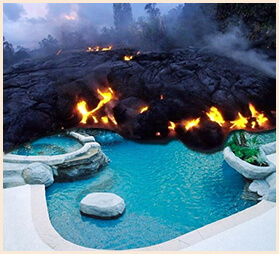
America has no shortage of natural disasters - Earthquakes in the west, Hurricanes in the south and Tornadoes across the Midwest. Freak fires and floods are frequent, nearly anywhere.
Swimming pools, not surprisingly, are affected by all of these natural disasters. Some effects are minor - while other calamity can spell catastrophe for a swimming pool.
EARTHQUAKES AND POOLS
Often thought to be a west coast concern, specifically California - earthquake risk is high in some surprising parts of the country (see map). They come without warning, and even if you had warning, what would you do?
Earthquake damage to swimming pools is rare. During an earthquake, the pool water shakes and sloshes, but in most cases, the pool will suffer no damage.
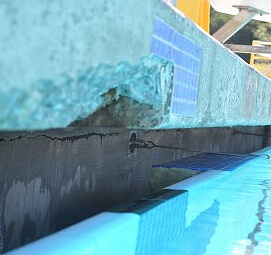
There are of course, cases where pools have become cracked, tilted, or suffered broken pipes from strong ground movement around the pool. In 2011, the Trefethen Aquatic Center at Mills College developed a nice crack above the gutter system, after only a 3.2 magnitude quake near Oakland, California.
Also in 2011, across the country in Mineral, Virginia, a 5.8 quake was felt all the way to New York. Verna Rogers, a retired Geologist in Lynchburg, Va, was skimming her pool when the quake began. "I knew immediately what it was", she said. The pool was fine, just the water was dancing and rippling.
There was little damage caused in general by the Virginia earthquake. Residents of the area were rather unimpressed by the event, although most reported that it was "kinda cool" to experience an earthquake.
FIRES AND POOLS
Home fires or nearby forest fires can make a real mess of a pool, with ashes and soot - possible debris. But even in fire-ravaged 2012, damage to pools was rare.
Fire is one of the 7 enemies of a pool cover, and sparks and embers could melt holes in nearly any pool cover type.
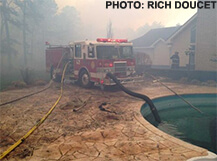
In a home or forest fire, swimming pools can actually be the hero, and save the day, as happened in Manorville, NY last year. Forest fires approached a home without a nearby fire hydrant, and after the trucks ran out of water, quick thinking West Sayville, NY firefighters began pumping water out of the pool to keep the forest fire at bay.
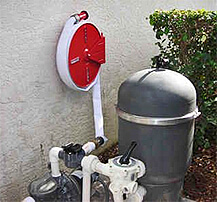
The owner was grateful that the house remained intact, even though the fire consumed the pool house. The pool was not harmed, just had to refill the 3+ feet removed to fight the fire. Full story here.
You can set up a home fire protection system, using your swimming pool water, in the event of a fire emergency. By switching a valve to pump from the main drain only, and opening another valve once the hose is rolled out, you can have a fire hose on hand, using water from the pool.
Portable pool fire pumps have proven effective at saving millions of dollars in property damage. Your swimming pool could help out in a fire emergency - on your home, or the home of your neighbor. With enough discharge hose, swimming pool fire pumps can put the water where you want it. Portable, gas powered pumps such as these can also be used on a river or lake - any body of water.
My preferred type of pump for this use as a portable firefighting pump would be a small Honda semi-trash pump with 2" suction and discharge ports, such as this Honda Semi-Trash pump found at Northern Tool., which pumps over 10000 gallons per hour (!).
Setting up your pool filter pump to deliver emergency fire water is also not hard, as described above. You only need a separate main drain valve, or a way to pump the water level below the skimmer, and you can pump 3000-7000 gallons per hour (depending on the size of your pool filter pump). Pump it out through the backwash hose, or connect the hose to a 3-way valve connected between the pump and filter.
FLOODS AND POOLS
Overflowing river banks, tidal floods and hurricane rains can cause severe damage to pools and pool equipment. The most common problem at the equipment pad can be ruined pool pumps and heaters. Rushing waters can sweep away pool equipment, slides or even pool decks!
Flooding waters that enter a swimming pool can bring all types of organic waste, phosphates, nitrates and pollutants. And mud, lots of silty dirt. In a worst case scenario, a drain and clean of the pool may be needed, to clean pool surfaces and replace contaminated waters.
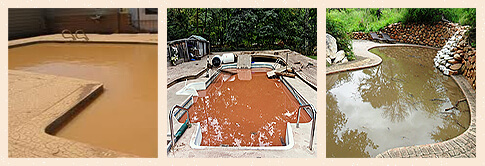
Aboveground pools may have a distinct advantage against flooding, over inground pools, which are less than a foot above the surrounding terrain. These pools here are quite clean during the flood, but imagine the mud and stains when the water recedes. Not a pretty sight. And the pool equipment, at least the pump, is undoubtedly ruined.
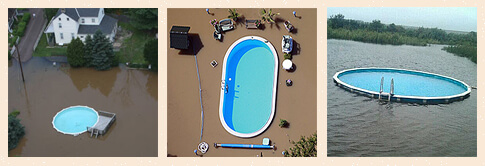
If enough water soaks into low lying terrain around a swimming pool - the worst thing imaginable can occur. A 10 ton inground pool can actually be lifted out of the ground, when underground water pressure is greater than the weight of the pool. Flooding is indeed the most serious of all natural disasters to affect swimming pools.
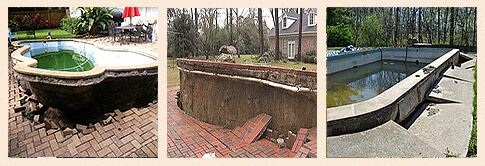
TORNADOES AND POOLS
You've seen the destruction of twisters and tornadoes on television. In places like Moore, Oklahoma - and other mid-western cities in "Tornado Alley", whole neighborhoods are completely destroyed. It must be the most frightening experience to see a dark funnel cloud heading your direction.
The damage caused by twisters are in many cases worse than that caused by other natural disasters. Swirling winds of 100 miles per hour, could completely demolish an aboveground pool, or fill an inground pool with debris from all over the neighborhood.
In this photo, debris fills the swimming pool of Gary and Barbara Tucker in Piedmont, Oklahoma. Their pool may be in better shape than their home, unfortunately.
Tornadoes and twisters can be found in most areas of the eastern two thirds of the United States, when weather conditions are right.
PREPARING FOR DISASTER
What can you do? Nearly nothing. In most cases, it's best not to put the cover on the pool, which can blow away or be damaged by flying debris, or burned with hot fire embers.
For heavy winds or flooding, remove any loose items from around the pool, including cleaning tools, toys, furniture and pool cleaners, and store them safely. Loose skimmer lids can be screwed in place or stored indoors.
If your pool pump is removable, move it to higher ground before the waters rise, to save the expense of motor replacement.
Really, there is little you can do to protect your pool equipment and pool from natural disasters like fires, floods, earthquakes and twisters. Just make sure you keep yourself and your family safe - don't worry about the pool. It'll be fine.